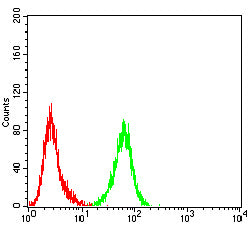


| WB | 咨询技术 | Human,Mouse,Rat |
| IF | 咨询技术 | Human,Mouse,Rat |
| IHC | 1/200-1/1000 | Human,Mouse,Rat |
| ICC | 技术咨询 | Human,Mouse,Rat |
| FCM | 1/200-1/400 | Human,Mouse,Rat |
| Elisa | 1/10000 | Human,Mouse,Rat |
| Aliases | CCNE; Pccne1 |
| Entrez GeneID | 898 |
| clone | 6C10B2 |
| WB Predicted band size | 47kDa |
| Host/Isotype | Mouse IgG1 |
| Antibody Type | Primary antibody |
| Storage | Store at 4°C short term. Aliquot and store at -20°C long term. Avoid freeze/thaw cycles. |
| Species Reactivity | Human |
| Immunogen | Purified recombinant fragment of human CCNE1 (AA: 1-100) expressed in E. Coli. |
| Formulation | Purified antibody in PBS with 0.05% sodium azide |
+ +
以下是关于CCNE1抗体的3篇参考文献及其摘要概括:
1. **文献名称**: "Amplification of CCNE1 is associated with poor prognosis in ovarian tumors"
**作者**: Etemadmoghadam, D., et al.
**摘要**: 该研究通过免疫组化(IHC)和Western blotting验证CCNE1抗体特异性,发现CCNE1基因扩增与卵巢癌患者预后不良显著相关,提示其作为潜在生物标志物的价值。
2. **文献名称**: "Cyclin E1 deregulation promotes mitotic instability and resistance to CDK4/6 inhibitors in breast cancer"
**作者**: Balsas, P., et al.
**摘要**: 作者利用CCNE1抗体在乳腺癌细胞系中检测蛋白过表达,发现CCNE1异常导致细胞周期失调和对CDK4/6抑制剂的耐药性,为靶向治疗提供依据。
3. **文献名称**: "CCNE1 copy number is a predictive biomarker of therapeutic resistance in TP53-deficient cancers"
**作者**: Karakaidos, P., et al.
**摘要**: 研究通过免疫荧光和流式细胞术分析CCNE1表达,发现其在TP53缺陷肿瘤中高表达,并与化疗耐药相关,提示其作为治疗反应预测指标的潜力。
4. **文献名称**: "Phosphorylation-dependent regulation of cyclin E1 stability and associated functions"
**作者**: Koepp, D.M., et al.
**摘要**: 该文献利用CCNE1抗体进行免疫沉淀和蛋白质稳定性实验,揭示其磷酸化修饰通过泛素-蛋白酶体途径调控细胞周期进程的分子机制。
这些研究均通过不同实验方法(如IHC、Western blot等)验证CCNE1抗体的应用,并探讨其在癌症机制与诊疗中的意义。
×